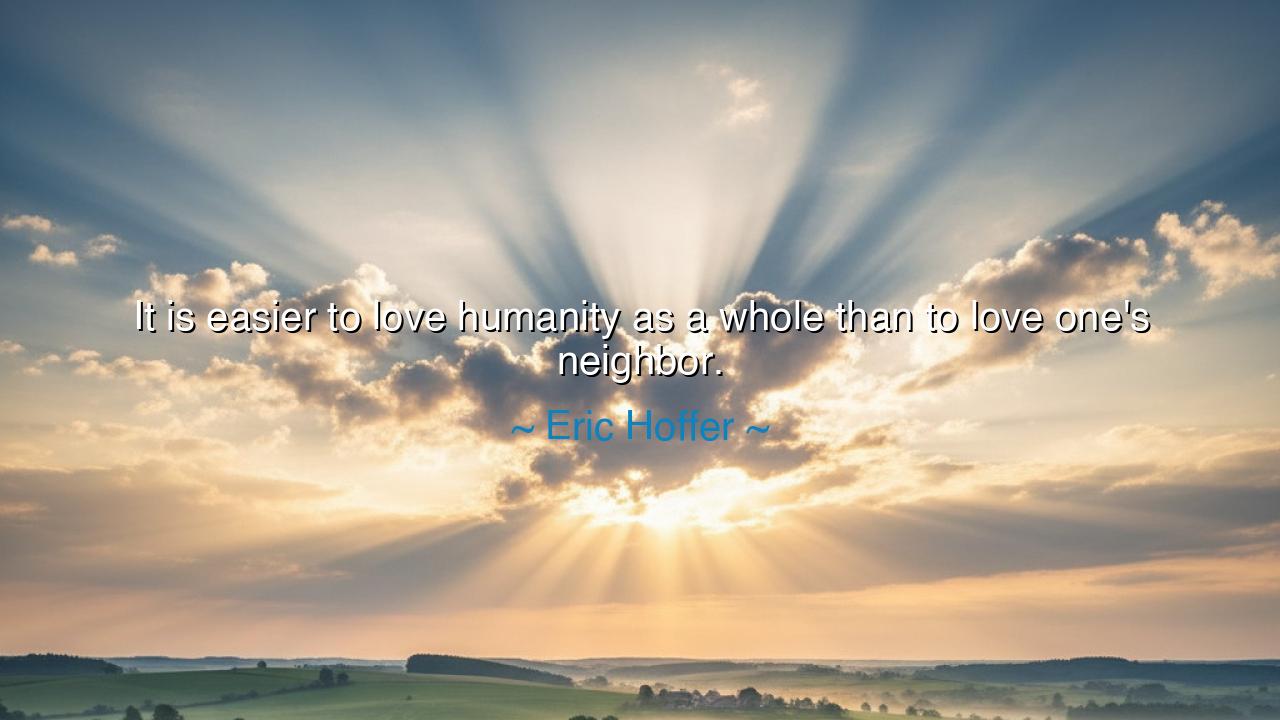
It is easier to love humanity as a whole than to love one's






When Eric Hoffer wrote, “It is easier to love humanity as a whole than to love one’s neighbor,” he revealed one of the most piercing truths of the human condition — that it is far simpler to profess love for the abstract than to practice it in the immediate. Hoffer, the American longshoreman-philosopher, was a man of deep observation. He understood that humanity, when seen from afar, can seem noble and inspiring — but when encountered up close, in the form of the imperfect, stubborn, and fragile individuals who surround us, love becomes far more difficult. For to love mankind requires only imagination; to love one’s neighbor requires humility, patience, and grace.
In this quote, Hoffer reminds us that idealism without intimacy is a deception. Many claim to love the human race — they speak of justice, equality, compassion for the world — yet struggle to forgive the friend who wronged them, or to show kindness to the stranger who irritates them. The love of humanity is vast but vague; it demands no sacrifice of pride, no confrontation with the flaws of others. But to love one’s neighbor — the person beside us, with their faults, their noise, their differing beliefs — that is the true test of the heart. It is easier to love an idea than a person, for people, unlike ideas, resist perfection.
The ancients, too, recognized this struggle. In the Gospels, Christ commanded, “Love thy neighbor as thyself,” not because it was easy, but because it was divine in difficulty. The Stoics spoke of practicing virtue not in theory, but in the marketplace — amidst the frustrations and frailties of daily life. Love, to them, was not a distant sentiment but a discipline, forged through contact with imperfection. The one who learns to love the neighbor learns to love the world in truth, not in illusion.
History gives us luminous examples of those who bridged the gap between ideal love and living love. Consider Mother Teresa, who did not love “humanity” as an idea, but loved the dying, the dirty, the forgotten — each person as a soul deserving dignity. Her love was not poetic, but practical: she touched wounds, fed the hungry, and comforted the unloved. She did what Hoffer warned the world against neglecting — she turned the abstract into the personal. In her hands, the love of humanity became the love of one human at a time.
Hoffer’s words also warn us of hypocrisy. Many speak of peace but sow division among their neighbors; many cry for compassion while harboring bitterness in their hearts. The world has been wounded not by the failure of ideals, but by the failure to live them daily. True love cannot exist in slogans — it exists in small acts: a listening ear, a patient word, a forgiving heart. To love humanity truly is to love the person in front of you, with all their faults and fears, for that person is humanity embodied.
And yet, to love one’s neighbor requires courage — the courage to see oneself in another. It demands vulnerability, for love at close range reveals our own flaws mirrored in others. The neighbor becomes a mirror, showing us our impatience, our pride, our limits. Only when we learn to love despite these reflections do we begin to understand the true nature of compassion. This is why Hoffer’s words ring so powerfully: they expose the ease of abstraction and the difficulty of authenticity.
So, my child, take this lesson to heart: do not love only the idea of goodness — live it. Let your love not be loud, but real; not grand, but near. Begin with those around you — your family, your friends, even those who test your patience. Offer kindness where it is hardest, and understanding where it seems undeserved. For every small act of genuine love is greater than a thousand grand speeches about humanity.
Thus, as Eric Hoffer teaches, “It is easier to love humanity as a whole than to love one’s neighbor.” Love, to be true, must descend from heaven into the dust of the earth — into the everyday, the personal, the imperfect. The love that changes the world begins not with mankind in the abstract, but with the single heart that stands before you. Love them well, and you will have loved humanity indeed.






AAdministratorAdministrator
Welcome, honored guests. Please leave a comment, we will respond soon